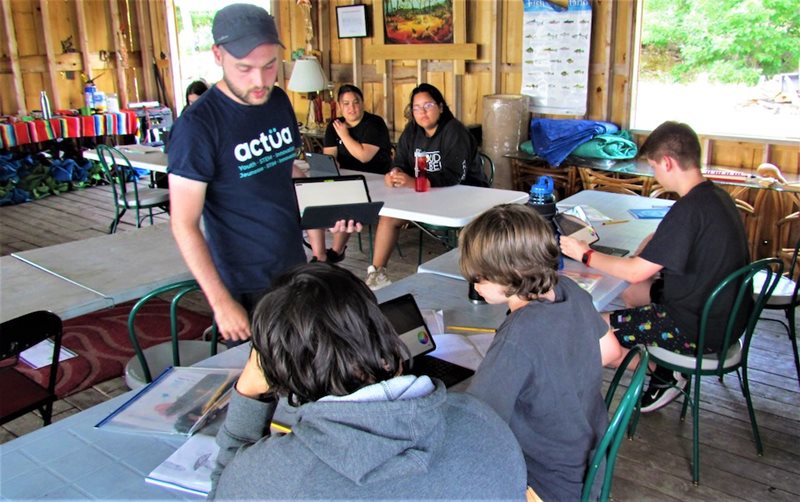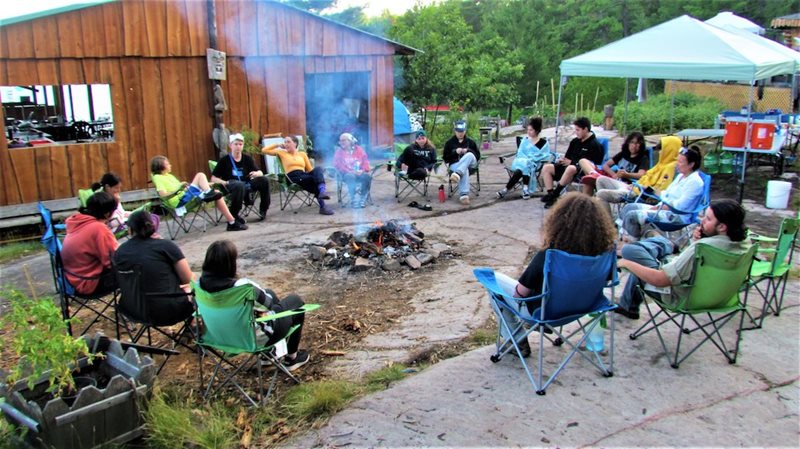Land-based learning impacts Indigenous youth at KM STEAM Land Camp
Aug 14, 2023 | Vanessa Tignanelli, Storyteller & Content Creator
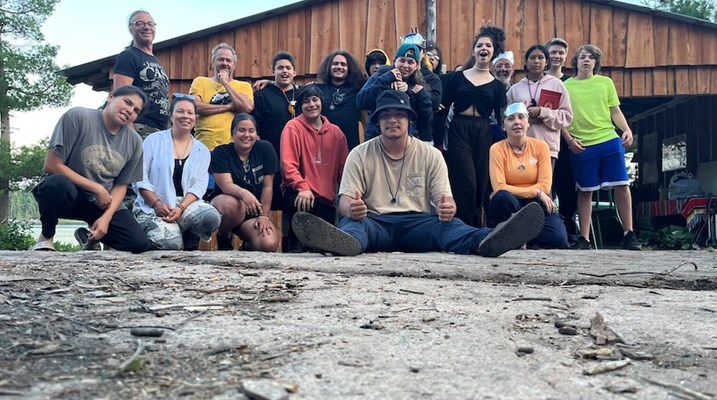
Kikandaaswiwin Mookiisin: “Knowledge springing forth from time immemorial.”
As society innovates and technology advances, the need for professionals who can propose solutions in the fields of science, technology, engineering, arts and mathematics (STEAM) continues to grow. Having an Indigenous voice behind these solutions is vital to our success and longevity.
Canadore College’s School of Indigenous Studies and the First Peoples’ Centre have created the Kikandaaswiwin Mookiisin (KM) STEAM Program as a way to link traditional Indigenous teachings with these industries.
Every summer, Indigenous students (aged 14-17) arrive at the off-grid Camp Petawachuan in Dokis First Nation on the French River to learn the fundamentals of STEAM through an 11-day course called the KM Indigenous STEAM Summer Land Camp. What makes Canadore’s Land Camp course unique is that it is grounded in Indigenous worldviews and is an accredited interdisciplinary course. Through land-based activities, workshops, mentorships, and connecting with Knowledge Keepers and Elders, students receive one high school credit and one college credit upon completion.
At its core, Land Camp encourages students to move through the four steps of the Circle of Courage: a sense of belonging, mastery, independence, and generosity (a principle created by Larry Brendtro, Martin Brokenleg, and Steve Van Bockern.) For some students, Land Camp is their first time away from home or learning about their culture. For everyone, it is meant to be a supportive environment in which to discover their most authentic, confident selves.
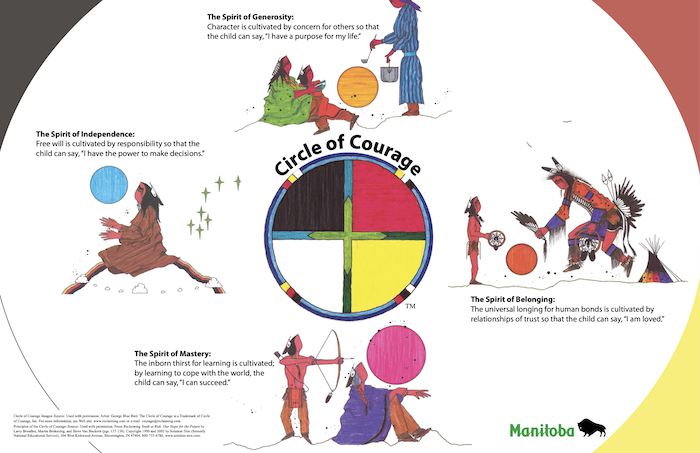
Tammy Cayer-Dokis, a professor in the School of Indigenous Studies and coordinator of KM STEAM program says, “Whether we are going into schools to do outreach or are training postsecondary students, we use the Circle of Courage as a guide when designing our programming. Each morning at Land Camp, we sit in a circle to begin with a sense of belonging, connection, and trust among each other. A circle helps us understand that we are all equal.”
This year, 14 Indigenous youth attended Land Camp from July 11-21st, hailing from areas such as Nipissing First Nation, Temagami, Chippewas of Nawash (Bruce Peninsula), Wikwemikong (Manitoulin Island), and Serpent River. Over their 11 days on the land, students learned about healthy soil, clean water, art expression, Indigenous history and cooking, among other skills. They participated in Sweat Lodge teachings guided by Duane Linklater and Tanya Lukin Linklater, a drum-making workshop with Gerry McComb, and learned the ancient tradition of black ash basketry. Every activity is rooted in the fields of STEAM while incorporating an Indigenous perspective.
“The basketry workshop combined all aspects of STEAM,” explains Tammy. “From the techniques used in making a traditional basket, to sustainable agriculture and forest management. The black ash tree is at risk of extinction due to invasive species, and so Indigenous peoples are also at risk of losing this part of our identity and culture.”

Hunter Spence, a second-year student in Canadore’s Digital Cinematography program, first attended Land Camp in 2018 as a grade 8 student from Chippewa High School. He recalls another activity that exemplified Land Camp’s unique combination of STEAM and Indigenous worldview:
“I remember the way they taught this one basic robotics activity that involved remote controlling an orb using coding on an iPad. You’re trying to get the orb across but there’s something stopping you; buildings in the way or highways you have to cross. They said, ‘this is what wildlife has to deal with. The everchanging environment and what humans are doing is making it harder for animals to live.’ It was a very poignant lesson and a great way to teach.”
“If someone is interested in STEAM, this Camp helps you discover new and effective ways to learn,” he says.
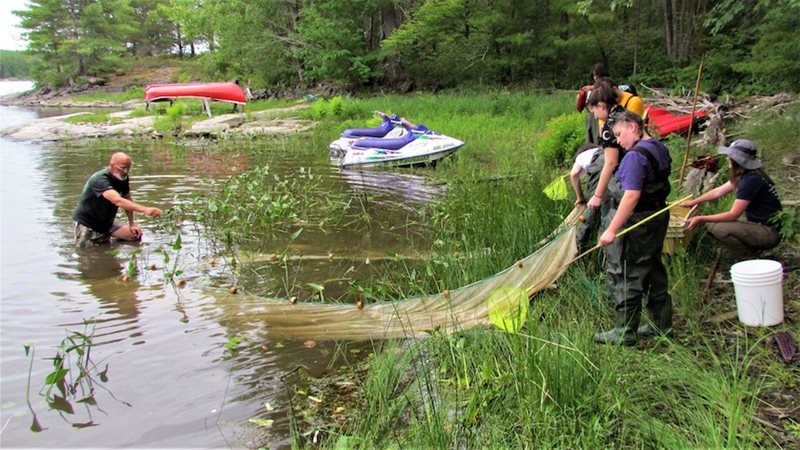
Hunter was asked to return the following year as a mentor, a position he continued to hold until 2022. With a wide range of backgrounds, skills, and experiences, the mentors are an integral part of Land Camp’s success. This year, six Canadore students were hired to assist with activities, run workshops, and to act as role models for the campers.
“This is an important final step in the Circle of Courage,” explains Tammy. “The mentors have entered the stage of becoming Knowledge Keepers and leaders themselves, and can give back to their communities with confidence.”
Hunter is now a student at Canadore College, entering his second year in the Digital Cinematography program. His paternal grandfather was Cree from Fort Albany First Nation, making Hunter ¼ Indigenous. “Camp helped me to become closer to and more confident in my Indigenous heritage. I sometimes question whether I really belong, but I think those negative thoughts go away at Camp, and I can embrace that these truly are my people, my culture, and who I am.”
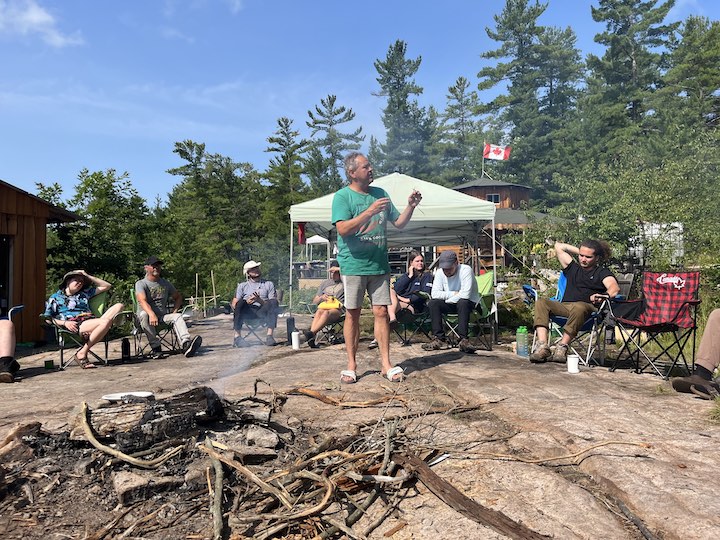
Kikandaaswiwin Mookiisin STEAM is made accessible to families thanks to the generous support of Actua, the principle funder of this year’s program, among other community partners that continue to offer in-kind services and supports. Actua is Canada’s leading science, technology, engineering, and mathematics outreach network, made up of 40 universities and colleges and engaging over 35,000 First Nations, Inuit and Métis youth in over 200 communities through school workshops and summer camp programs. The First Peoples’ Centre is a proud member of Actua’s network.
By creating strong pathways beginning in elementary school and continuing into high school and post-secondary, KM STEAM prepares Indigenous youth for successful educational experiences and careers in new and emerging STEAM fields. Land-based learning has become an integral component to empowering and preparing Indigenous youth to be stewards of the land in their future careers.
“This camp is unique because it’s meant for Indigenous people,” explains Hunter. “When we’re not doing STEAM activities, we’re walking through the back trails and looking at the different plants, describing the bark, the berries that grow, and what they mean to us. For an Indigenous person, this is valuable and important information. We are always willing to learn something that involves our culture.”
Learn more about Kikandaaswiwin Mookiisin.
Photos by Tammy Cayer-Dokis, Gerry Lachance, and Jason Harris.
